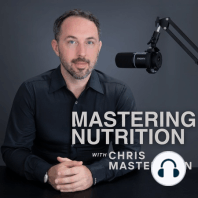27 min listen

How do you determine if you’re getting enough protein? | Masterjohn Q&A Files #18
How do you determine if you’re getting enough protein? | Masterjohn Q&A Files #18
ratings:
Length:
3 minutes
Released:
Dec 3, 2019
Format:
Podcast episode
Description
Question: "How do you determine if you're getting enough protein? I heard Dr. Stephen Phinney say, for those on a keto diet, if ketones are greater than 3 on a regular basis, then it's a sign you're not getting enough protein." First of all, why are you on a ketogenic diet? If your purpose is to get the ketones, why wouldn't you want your ketones higher than 3? The ketogenic diet is, regardless of what people are doing it for, it's best tested in terms of epilepsy, and the classical ketogenic diet gets ketone levels up to 3 or 4 millimoles per liter… sometimes higher. Then the question is, you're not doing it for medical therapy, why are you doing it? If you're doing it to lose weight, who cares what your ketones are? There's a ton of people out there who are on a "ketogenic diet" who don't care what their ketones are because they're doing it for weight loss, for body composition, or to feel better. If those are what your goals are, your metrics should just be whether you're losing weight, whether you're getting better body composition, or whether you're feeling better. There's no data backing up the fact that you can measure your blood ketones and determine what any of those outcomes are going to be. That has nothing to do with why you need protein. Yes, too much protein is probably going to lower your ketones. Protein is anti-ketogenic. It's not as anti-ketogenic as carbs are, so I get the kernel of truth that Phinney is getting at. The higher your protein is, the lower your ketones are going to be, and maybe there's some general correlation to be seen across people that the people who tend to have ketones that high tend to not be eating enough protein, but that's a correlation that has nothing to do with the underlying reason of why you eat protein. You eat protein because you need protein to optimize your neurotransmitters, you need protein to optimize your metabolism, and you need protein to optimize your body composition. The number one metric that we have on protein intakes and quantifying them is on body composition, and you want a half a gram, to a gram of protein for every pound of target body weight. So, if you're trying to gain muscle, use what you want to have at the end of gaining muscle. If you are overweight, use what your ideal weight would be. And the more you care about your body composition, the more you should aim for the top of that range instead of the bottom. It doesn't matter if you're keto or not. This Q&A can also be found as part of a much longer episode, here:https://chrismasterjohnphd.com/podcast/2019/02/09/ask-anything-nutrition-feb-1-2019/ If you would like to be part of the next live Ask Me Anything About Nutrition, sign up for the CMJ Masterpass, which includes access to these live Zoom sessions, premium features on all my content, and hundreds of dollars of exclusive discounts. You can sign up with a 10% lifetime discount here: https://chrismasterjohnphd.com/q&a
Released:
Dec 3, 2019
Format:
Podcast episode
Titles in the series (100)
003: The Sugar Conspiracy -- Trading One Nutritional Boogeyman for Another: In his April 7, 2016 piece in The Guardian, "The Sugar Conspiracy" Ian Leslie argues that the politics of nutrition has blinded us to the fact that sugar is more deserving than saturated fat of the status of dietary arch-villain and that the... by Mastering Nutrition